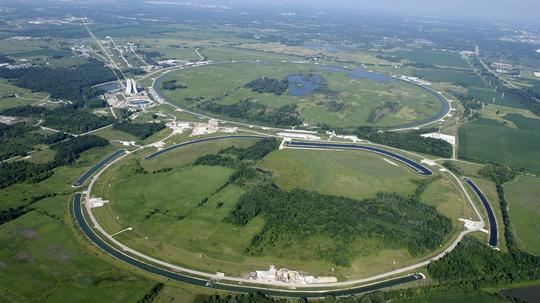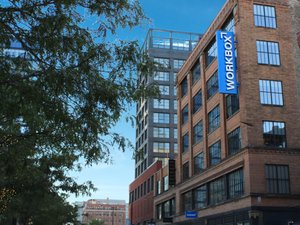
One of two national laboratories located in Chicago's backyard, Fermilab is located about 40 miles west of the city in Batavia, Illinois. Known just as much for its particle accelerators as it is for the herd of bison that call its 6,800 acre open prairieland home, Fermilab last week celebrated the 50th anniversary of the day scientists and researchers first showed up for work onsite.
And while the lab is holding a variety of public events year around to celebrate the anniversary, it also continues to keep doing what it does best -- research partnerships that push the boundaries of scientific inquiry and knowledge.
Chicago Quantum Exchange, based at the University of Chicago
The University of Chicago recently announced a new collaboration with both Fermilab and Argonne to launch a research hub focused on quantum science (“quantum” = the minimum amount of any physical entity involved in an interaction). This hub within the University’s Institute for Molecular Engineering (UChicago’s first ever engineering program) is called the Chicago Quantum Exchange, and hopes to push quantum research forward with applications in communication, computing and sensing.
Serving as director of the Chicago Quantum Exchange will be David Awschalom, professor of Molecular Engineering at UChicago and a senior scientist at Argonne.
“We are at a remarkable moment in science and engineering, where a stream of scientific discoveries are yielding new ways to create, control and communicate between quantum states of matter,” Awschalom said in a statement. “Transformative technologies are likely to emerge [from the Center] with far-reaching applications—ranging from ultra-sensitive sensors for biomedical imaging to secure communication networks to new paradigms for computation. In addition, they are making us re-think the meaning of information itself.”
The CQE will also tap into UChicago’s community-focused startup incubator Polsky Center for Entrepreneurship and Innovation, establishing a strong connection with its recently announced expansion. “The Polsky Center connects researchers with industry partners that are looking for new technologies to license or want to launch startups based on a new technology,” said UChicago Vice President of Entrepreneurship and Innovation, John Flavin, in an email to Chicago Inno.
“As our scientists and engineers make discoveries and create new technologies, we will work with them to determine the path of their research to market—through industry collaborations and license agreements, or by helping them start a new company around the technology,” he continued. Researchers will have immediate access to Polsky’s 34,000 square foot space, events, workshops, mentors and all UChicago-organized startup competitions.
Center for Applied Physics and Superconducting Technologies, based at Northwestern University
Not to be left behind, Northwestern University also announced a new collaboration with Fermilab, the Center for Applied Physics and Superconducting Technologies (CAPST).
Superconductors, materials that conduct electricity with little to no resistance, are widely recognized to have applications in particle physics, solid-state physics, materials science, medicine, energy and environmental sciences. The center will build upon Northwestern's research expertise in this field with select faculty having adjunct appointments at, and access to, both institutions.
“The center is a marriage of basic science, applied research and technology development,” said CAPST co-director and Northwestern Professor James Sauls, in a statement. “This effort provides cross-institutional access to high-value research equipment and facilities while also allowing Fermilab to tap into Northwestern’s expertise in the field of superconductivity and materials physics.”
The collaboration has already resulted in Northwestern receiving a research grant for CAPST from the Physics Division of the National Science Foundation. “The grant from NSF will also help bring a greater presence of accelerator science to the university and provide new research opportunities for graduate students, both at Northwestern and Fermilab,” Sauls said.
Fermilab, along with Chicago's other national lab, Argonne, has impacted a large range of scientific discovery from how we clean oil spills to how the first ever high energy beam was produced.
Both Fermilab and Argonne are facing serious budget cuts under the new administration, including to the size of its research personnel. Congressman Bill Foster (D-Ill.), whose district covers Fermilab, recently led a bipartisan effort to ask Energy Secretary Rick Perry for the full details of how budget cuts could impact personnel at both Argonne and Fermilab. The letter was signed by fifty-five members of Congress and requested a response from the administration by June 2, 2017. A spokeswoman from the Office of Congressman Foster confirmed to Chicago Inno that as of June 28, they still hadn't received a response.
Update: The National Science Foundation responded to Congressman Foster's letter on July 6, 2017, stating that approximately 13,000 positions would be affected by the cuts to scientific research and funding proposed by the Trump administration. The full response to the letter can be found here.








